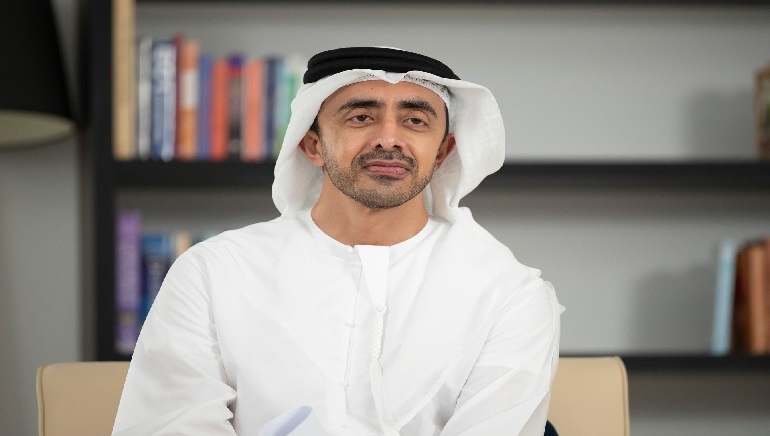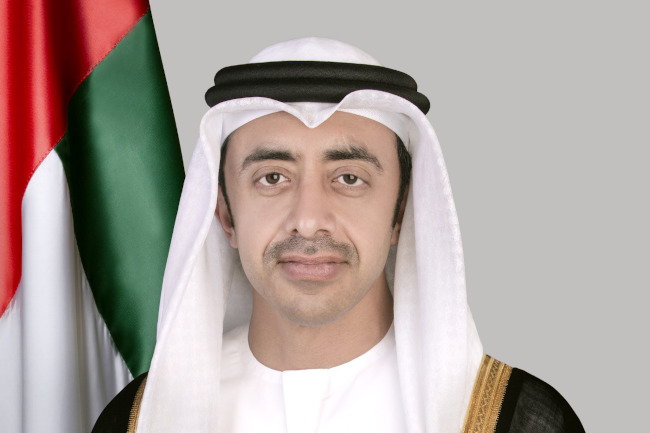Abdullah bin Zayed condemns Israeli attack on Doha, marking a significant moment in Middle Eastern diplomacy. The recent airstrike on Qatar’s capital has triggered widespread outrage across the Gulf region and the international community. Sheikh Abdullah bin Zayed Al Nahyan, UAE’s Minister of Foreign Affairs and International Cooperation, strongly denounced Israel’s actions, describing the attack as a blatant violation of Qatar’s sovereignty and international law.
The strike targeted a meeting of Hamas leaders in Doha, resulting in multiple casualties, including Hamas officials and Qatari security personnel. This unprecedented action has heightened tensions in the region, threatening ongoing peace initiatives and creating new challenges for diplomatic relations between Middle Eastern countries. In response, the UAE reaffirmed its unwavering support for Qatar, emphasizing that any violation of sovereignty undermines regional security and stability. Abdullah bin Zayed condemns Israeli attack on Doha as a serious affront to international norms, and his statements reflect the UAE’s commitment to upholding Gulf unity.
Context of the Attack
The airstrike on Doha represents a critical escalation in ongoing regional conflicts. Qatar, which has consistently played a mediating role in peace efforts in Gaza, became the target of this military operation at a pivotal moment. Senior Hamas officials were meeting in the capital to discuss potential ceasefire agreements and ongoing peace initiatives. Tragically, several key figures were killed, including Qatari security personnel, while some senior leaders survived.

Abdullah bin Zayed condemns Israeli attack on Doha because it not only violates Qatar’s sovereignty but also undermines diplomatic efforts that could lead to lasting peace. The UAE’s strong response underscores the importance of maintaining respect for international law and preventing military actions that threaten the stability of neutral nations. The attack highlighted vulnerabilities even in countries perceived as politically stable, making it a warning to the region about the risks of unilateral aggression.
UAE’s Solidarity with Qatar
Abdullah bin Zayed condemns Israeli attack on Doha in strong terms, describing it as a “treacherous and cowardly act.” The UAE has expressed full solidarity with Qatar, emphasizing that any act of aggression against one Gulf nation is a threat to all. The leadership in the UAE, including President Sheikh Mohamed bin Zayed Al Nahyan, directly communicated with Qatar’s Emir, Sheikh Tamim bin Hamad Al Thani, to reaffirm support and coordinate responses.

Abdullah bin Zayed condemns Israeli attack on Doha by calling for the international community to take immediate action against such violations. He stressed that inaction only encourages further breaches of sovereignty, which could destabilize the entire region. The UAE’s firm position demonstrates that it is prepared to protect its neighbors while advocating for lawful and diplomatic solutions.
Regional Reactions
The airstrike on Doha sparked condemnation across the Arab world. Gulf states and North African countries described the attack as a direct threat to regional security. Leaders emphasized that targeting Doha undermines ongoing diplomatic efforts and escalates tensions at a critical time for regional cooperation. Abdullah bin Zayed condemns Israeli attack on Doha as part of a broader effort to uphold Gulf solidarity and protect the security of the entire region.
By standing firmly with Qatar, the UAE sends a message to the international community about the importance of defending sovereignty. The condemnation highlights that aggressive actions like this not only complicate peace negotiations but also increase the potential for conflict to spread. Abdullah bin Zayed condemns Israeli attack on Doha as a direct challenge to diplomacy and humanitarian efforts in the Middle East.
Global Implications
Abdullah bin Zayed condemns Israeli attack on Doha because it has far-reaching implications beyond the Gulf region. Such actions challenge international norms related to sovereignty, conflict resolution, and diplomatic immunity. Experts suggest that attacks of this nature risk destabilizing a fragile region and may provoke wider confrontations if left unchecked. The UAE’s position emphasizes that military actions must always respect international law and minimize civilian harm.
The condemnation also serves as a warning to other nations considering unilateral operations: violations of sovereignty will face strong regional opposition. Abdullah bin Zayed condemns Israeli attack on Doha while calling for multilateral solutions to conflicts in the Middle East. This approach highlights the UAE’s commitment to proactive diplomacy and its role as a stabilizing force in the region.

Security and Diplomatic Consequences
The Doha airstrike is expected to have major consequences for diplomacy and security in the Gulf. Qatar has traditionally acted as a mediator, facilitating dialogue between Hamas, Israel, and other stakeholders. The attack undermines this role, creating uncertainty and complicating peace efforts. Abdullah bin Zayed condemns Israeli attack on Doha as a violation of regional stability and a challenge to diplomatic norms.
The UAE’s condemnation also underscores the need for coordinated security planning among Gulf nations. Abdullah bin Zayed emphasizes that protecting sovereignty and regional peace requires increased cooperation to prevent similar attacks in the future. The UAE’s leadership demonstrates that it will play a proactive role in addressing potential threats while promoting regional unity.
Humanitarian Concerns
Abdullah bin Zayed condemns Israeli attack on Doha because the strike jeopardizes humanitarian efforts in Gaza. Qatar has facilitated aid and negotiations for ceasefires, ensuring civilian protection during conflicts. The attack has complicated these efforts and created a climate of fear that may hinder diplomatic engagement.
The UAE stresses that attacks undermining peace initiatives put innocent lives at risk. Abdullah bin Zayed condemns Israeli attack on Doha to reinforce the need for prioritizing humanitarian concerns alongside diplomatic efforts. The UAE advocates for renewed dialogue and cooperation to ensure that humanitarian aid and peace negotiations can continue without interference from external aggression.
UAE’s Role in Middle Eastern Diplomacy
Abdullah bin Zayed condemns Israeli attack on Doha as part of the UAE’s broader commitment to regional diplomacy. The UAE has long positioned itself as a mediator capable of bridging divides between conflicting parties. By taking a firm stance with Qatar, Abdullah bin Zayed strengthens the UAE’s credibility as a defender of international law and a stabilizing force in the region.
Gulf security is central to the UAE’s strategy. Abdullah bin Zayed condemns Israeli attack on Doha while highlighting that a threat to one Gulf nation is a threat to all. This unified message reinforces the importance of cooperation and vigilance, sending a strong signal to the international community about the UAE’s dedication to peace and stability.
Looking Ahead: Stability and Peace
Abdullah bin Zayed condemns Israeli attack on Doha and calls for measures to prevent further escalations. Long-term stability in the Middle East requires dialogue, negotiation, and adherence to international norms. The UAE advocates for a regional approach to security and conflict resolution, emphasizing collaboration among Gulf states, international organizations, and global powers.
Abdullah bin Zayed condemns Israeli attack on Doha as a warning against unilateral military actions and a call for collective efforts to uphold peace. His leadership demonstrates that diplomatic engagement, respect for sovereignty, and humanitarian considerations must guide responses to conflicts in the region.
Conclusion
Abdullah bin Zayed condemns Israeli attack on Doha as a violation of Qatar’s sovereignty and a threat to Gulf security. The UAE’s response highlights the need for regional unity, adherence to international law, and proactive diplomacy. The Doha airstrike not only affects peace efforts in Gaza but also challenges broader regional stability.
Through his condemnation, Abdullah bin Zayed reinforces the UAE’s role as a defender of Gulf interests and a promoter of dialogue over aggression. The incident serves as a reminder that breaches of sovereignty have far-reaching consequences, and that unity, vigilance, and international cooperation are essential to ensure lasting peace in the Middle East.
Do follow UAE Stories on Instagram
Read Next – UAE President Meets Ruler of Umm Al Quwain to Strengthen Unity















